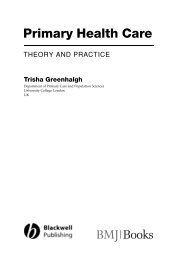Download File - JOHN J. HADDAD, Ph.D.
Download File - JOHN J. HADDAD, Ph.D.
Download File - JOHN J. HADDAD, Ph.D.
You also want an ePaper? Increase the reach of your titles
YUMPU automatically turns print PDFs into web optimized ePapers that Google loves.
Peptide-Based Active Immunotherapy in Cancer 123<br />
PROSPECTS<br />
The growing number of TAA identified in many tumor types becomes a solid<br />
basis for peptide vaccine development. However, the antigenic profile of human<br />
tumors is very complex and consists of many peptides originating from various<br />
classes of protein. This fact should be considered carefully in designing anticancer<br />
vaccines. An important question is which tumor antigens are the most important in<br />
tumor regression in vivo. In any case, the ideal peptide vaccine most likely will<br />
consist of a cocktail of tumor antigenic peptides. However, the number of epitopes<br />
in the vaccine cocktail should be evaluated carefully since CTL responses in AIDS<br />
patients directed to fewer epitopes are associated with better clinical outcome (89).<br />
In this case it appears that the stimulation of multiple simultaneous CTL responses<br />
is clinically inefficient. The dose of antigen and the speed of antigen release in the<br />
vaccine formulations are also very important. High doses of antigen released faster<br />
may induce T-cell tolerance (90). Immune tolerance may be due to fast expansion<br />
and subsequent elimination of specific T-cell clones, or to apoptosis induced by<br />
repeated stimulation of already stimulated T-cells in cell cycle (91,92). Therefore,<br />
it is essential to select as immunogens those epitopes against which tolerance has<br />
not been induced (93,94).<br />
Currently, clinical responses to peptide vaccines, as determined by the criteria<br />
set for chemotherapy and radiation, have been difficult to assess. However,<br />
the lack of toxicity of peptide vaccines in patients with many different tumor<br />
types, and the clearly observed efficacy in some studies, support the use of peptide<br />
vaccination. Future peptide vaccine strategies will most likely focus on more<br />
potent and combined approaches for immunization. Applied in conjunction with<br />
surgery, radiotherapy, and/or chemotherapy, peptide vaccines can be effective in<br />
eliminating micro-metastases, in decreasing the immunosuppressive effects of the<br />
chemotherapy or radiotherapy, and in increasing the resistance to viral or bacterial<br />
infections frequently occurring in cancer patients. Recent advances in the design of<br />
polyvalent vaccines targeting several antigens are also very promising. In addition,<br />
the possibility to treat patients with peptide vaccines earlier in the course of the<br />
disease and to combine vaccines with other treatment modalities may also improve<br />
the vaccine efficacy. As a result, immunotherapy with peptide vaccines may<br />
become a major treatment modality of cancer in the near future.<br />
REFERENCES<br />
1. Rammensee HG, Friede T, Stevanoviic S. MHC ligands and peptide motifs: first<br />
listing. Immunogenetics 1995; 41:178–228.<br />
2. Rammensee HG. Antigen presentation—recent developments. Int Arch Allergy<br />
Immunol 1996; 110:299–307.<br />
3. Yewdell JW, Norbury CC, Bennink JR. Mechanisms of exogenous antigen presentation<br />
by MHC class I molecules in vitro and in vivo: implications for generating<br />
CD8þ T cell responses to infectious agents, tumors, transplants, and vaccines. Adv<br />
Immunol 1999; 73:1–77.

















